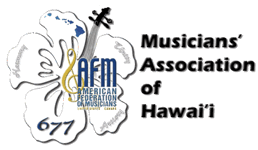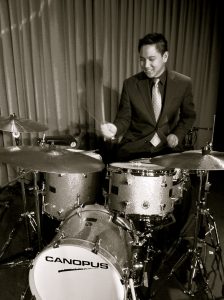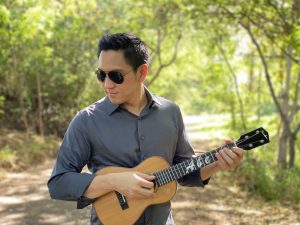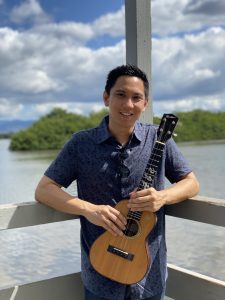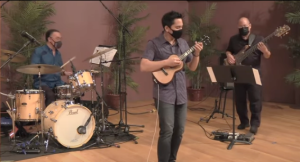Member Spotlight:
Abe Lagrimas Jr. — Multi-faceted, Multi-talented Local Hero
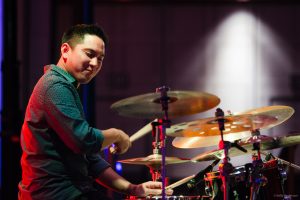
Hailing from Waipahu, award-winning multi-instrumentalist Lagrimas Jr. took an interest in drumming at a young age (four!) to grow and learn and become one of Hawai’i’s most respected, in-demand, original artists. Photo by Kelly Anderson
Lots of Local 677 members talk up medical benefits, emergency financial assistance, equity and support during contract negotiations, and a general safety net of assistance. Nā Hōkū Hanohano Award winner two times over, Abe Lagrimas Jr. (Solo Ukulele – The King of Pop, Beyond Words), 40, appreciates all that, too. But he cited another, more musical perk: full, weekly use of the Hawai’i Musician’s Union studio for tutoring time, rehearsals, and live performances with some amazing local heroes.
A local hero himself — Guam-born Waipahu grad — the in-demand, multi-genre (pop, Hawaiian, world music, jazz) multi-instrumentalist (drums, vibes, ukulele), educator, and published author first joined the Musicians’ Association of Hawai’i, AFM Local 677 as a high schooler. Lagrimas took full advantage of studio time to jam and connect with some awesome players, while steadily gigging more and more.
“At the time, ‘Studio 6’ was the place for live jazz in Honolulu,” he enthused.
Accolades soon followed: Modern Drummer grand prize to study at the Drummers Collective in New York City at 14, performing at the Kennedy Center for the Betty Carter Jazz Residency Program while still in high school, going to Berklee College of Music as a drum principal on scholarship, one of 12 semi-finalists selected from around the world to compete in the 2012 Thelonious Monk International Jazz Drums Competition in D.C., a 2008 Hawai’i Music Award (A Pass Out RecordsChristmas), those Nā Hōkūs…
Lagrimas has also played with his share of world-renowned musicians, in and out of Hawai’i, including drummer/vibist Noel Okimoto, trumpeter DeShannon Higa, ukulele phenom Jake Shimabukuro, taiko drumming master Kenny Endo, pianist Rich Crandall, Grammy-winning R&B singer James Ingram, and saxophonists Eric Marienthal, Kamasi Washington, and Dave Binney.
He spent a few formative years pounding the pavement among the crème de la crème of working musicians in L.A., not an easy city to make mark. But the multi-talented artist held his own and then some.
Ke Ola O Na Mele caught up recently:
First of all, that jumping, jaunty, slightly venomous ukulele solo on Nirvana’s “Smells Like Teen Spirit” from a 2009 Higher Ground performance… You bring in gypsy jazz, a hint of Flamenco, some Indian tones and flight rhythms…all dancing around the meat of Kurt Cobain’s driving, dramatically deriding melody. Your pop covers are phenomenal, somehow uniquely your own (as if you came up with the tune on the spot), yet uniquely a special tribute. In fact, you won a Nā Hōkū Hanohano Award in 2011 for your Michael Jackson tribute album, Solo Ukulele – The King of Pop, where you absolutely make the artist sound poetically Renaissance. Where do you get your inspiration from and why pop covers?
First of all, thank you Carol for your interest in featuring me to talk about my music career. At that time, I was very much interested in discovering the full potential of the ukulele by arranging songs, popular songs that you wouldn’t normally expect to be heard on a high-G ukulele. The ukulele doesn’t have a wide range and can only play four notes simultaneously so in that regard, it’s quite limited compared to other chordal instruments, so finding ways to cover a song was both challenging and fun. I mainly find inspiration from the music I listen to, so I try to listen to a wide variety, pop, jazz, metal, as well as music from countries around the world.
Besides ukulele, you also play drums and vibraphone in a myriad of genres, from pop and adult contemporary to world music and jazz. (Imagine you tearing into Nirvana percussively.) You actually started off playing drums at age four and won the grand prize from Modern Drummer Magazine to study at Manhattan’s Drummer’s Collective by the time you were 14. As a multi-instrumentalist, where does your heart lie, or are you most comfortable and in your groove on all three instruments?
I’ve been playing drums the longest, so I consider myself first and foremost a drummer. It’s what I enjoy and what I feel the most connected to.
Drummers often play vibes. But where does the ukulele come in? That’s a whole other muscle, kind of. What do you get out of playing each instrument? How is playing ukulele different from vibes in terms of sound, tone, and feel?
I became interested in learning the vibraphone and ukulele, because I wanted to gain a deeper understanding of melody and harmony. I wanted to compose my own music early on and I realized that that can only happen once I learned how melody and harmony function. The drums, vibraphone, and ukulele are three instruments that require different techniques to play, which also results in three angles I can use to come up with musical ideas. As a drummer, your primary role is to support the other musicians, so that was all I was concerned about by just being a drummer. Once I picked up the ukulele and started performing my original music and arrangements, my role changed to being more of a lead player, and that took some time for me to get used to.
Your collaborative projects and gigs are also noteworthy, including the 2020 debut of the trans-Pacific U3 album, In Waves (where you sing!), with fellow multi-instrumentalist/singer-songwriter and popular YouTuber Cynthia Lin, creator of the #100Days of Ukulele Songs, and San Francisco-based Kala artist Ukulenny. What kinds of musical collabs are you drawn to and what have been some of your favorites?
Ah yes U3, not to be confused by U2. On the surface, U3 is a fun and easy-going ukulele trio playing mostly cover tunes. But if you dig a little deeper when listening to our album In Waves or if you’re able to see one of our performances, you’ll hear that there’s a little more going on than just us playing the tune. We incorporate techniques like song mash-ups, ukulele and vocal harmonies, and fun arrangements that bring new life to popular classics. U3 started off as a group of friends that turned into a band. This year was a busy one for us, having done a U.S.-Canada West Coast tour, followed by a European tour this past summer. You spend a lot of time with your band mates, and having been involved in many different groups touring all over the world, I feel that making music and having fun onstage is so much easier to do when everyone on that stage gets along with one another.
While we’re on other artists, who inspires you, who or what made you want to pursue music as a career?
I find inspiration in everyday life. In addition to listening to music and being inspired by the people I share the stage with, I also find inspiration from my travels, learning about different things, being in the practice room, striving to achieve the goals I set for myself, my relationships with my wife, friends, and family, things we all do and go through every day. I feel this is extremely important as artists that the music we put out there reflects who we are and that it shall continue to grow and evolve.
What made you decide to join the Musician’s Union, and how long have you been a member?
I originally joined the Musician’s Union back when I was in high school. At the time, “Studio 6” was the place for live jazz in Honolulu.
“I kept busy gigging as a high school student while playing in many different groups led by Noel Okimoto, Rich Crandall, DeShannon Higa, and Phil and Bob Scellato to name a few, so joining the union made sense.”
Although I was not in the union when I lived in Los Angeles, I kept active by playing in “rehearsal bands,” ensembles made up of anywhere between six-20 people that would meet weekly at the L.A. Musician’s Union to read through charts. It was a great opportunity to be in the scene (meet/network) and play with world-class musicians on a regular basis.
What have been some amazing benefits of being a member that musicians may not realize?
Since moving back to Hawaii, I started up teaching drum lessons again at the Musician’s Union. One of the benefits I’ve been taking advantage of is having a place to practice and teach out of weekly. I’ve also been a part of numerous performances at Studio 909, led by local musicians, visiting artists, and shows sponsored by the Music Performance Trust Fund (MPTF).
You lived and worked in L.A. for a spell before returning home to Hawaii. What was that like and…stupid question, but what brought you back?
My time in L.A. (2007-2022) was filled with many ups and downs, but I accept it all and don’t regret a single thing. I absolutely loved my time there and I’m happy with what I was able to do in those 15 years. There’s so much that happened, I could possibly do a whole separate interview on just that. Briefly though, I learned how to survive and make it work as a full-time working professional musician in a city that’s filled to the brim with the best musicians in the world. During the pandemic, I met my wife in L.A. and thinking about what the next chapter in our lives would be is what ultimately brought us to Hawaii.
What are you up to lately? It shows on your website that Beyond Words (2021) was your last album, that you also teach privately, and have published a book about playing ukulele in the jazz genre (“Jazz Ukulele: Comping, Soloing, Chord Melodies,” Berklee Press & Hal Leonard).
Shameless plug, Beyond Words also won the Nā Hōkū Hanohano Award for “Ukulele Album of the Year” in 2022! These days, I’m currently keeping busy with teaching private lessons on drums and ukulele, playing gigs around town, and continuing to tour when the opportunity arises. In 2024, I’ve set a goal for myself to start back up on composing regularly, form my own group, and record a new album.
Now that you’re back in Hawaii, where you grew up, tell us what you love most about the islands. Not just playing here, but what makes this place so special.
The culture, the beautiful environment, and the people are what make Hawaii so special. Plus, the fact that I was raised here and all my family still live here.
Also, congratulations on your recent wedding! Who’s the lucky lady?
Thank you! Her name is Karen and we met during the pandemic in 2020. The ukulele is what brought us together. Long story short, she picked up the ukulele as a new hobby during the pandemic and became interested in learning more about the instrument and other ukulele players. She found me, became a fan of my music, and the rest is history. We recently held our wedding reception at Studio 909 in the Musician’s Union.
Living in Hawaii can get a bit expensive. How are you making ends meet as a working musician and tutor?
Hawaii is expensive, but in actuality, it’s not that much of a difference than L.A. Gas is more expensive in L.A., plus, I’m driving a lot less here. Between teaching regularly, gigging regularly, and having to go on the road every two-three months or so, it’s enough for me to live comfortably. It’s a system that seemed to work for me when I was in L.A., the only difference now is that I get to live in one of most beautiful places on earth.
Watch Abe Lagrimas Jr. in action. YouTube links below:
- Abe Lagrimas Jr. Quartet (drums)
- Abe Lagrimas Jr. Quartet (ukulele)
- Abe Lagrimas Jr. (multi-instrumentalist)
From the Fall/Winter 2023-2024 issue, Ke Ola O Na Mele
